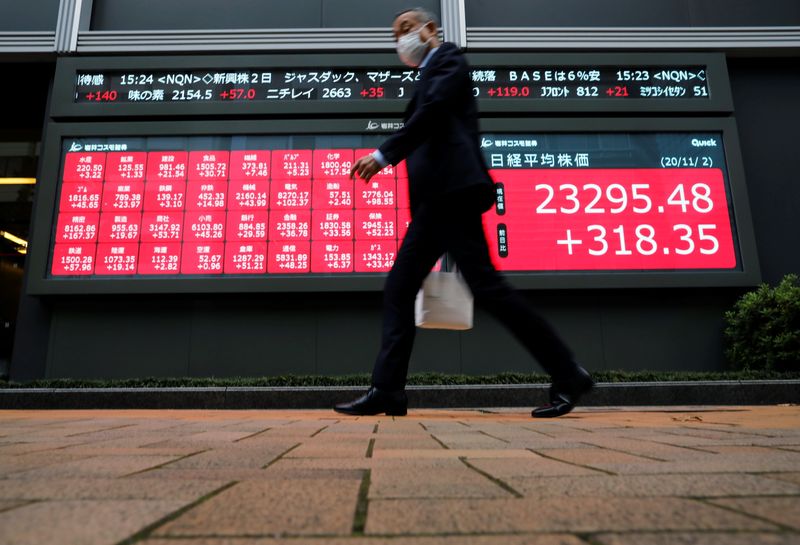By Swati Pandey and Tom Westbrook
SYDNEY/SINGAPORE (Reuters) - Central banks in Asia struggled to smother a selloff in global bonds on Friday, piling pressure on their bigger peers to do more, as spooked investors sold assets to cover deepening losses and rushed out of crowded positions in stocks.
The erratic trade evoked memories of last March and comes as the pandemic recovery enters a delicate phase, with financial markets moving swiftly to price in an end to the cheap money that had lit a fire under world stocks for a year.
Australia's central bank launched a surprise bond buying operation to try and staunch the bleeding, calming cash markets but barely taming the fear, evident in more liquid futures trade.
The Bank of Korea promised as much as $6.3 billion in new bond buying before the end of June, but the currency kept crumbling for a two-day fall of more than 1.5%.
And as selling spread to gold, stocks, commodities and emerging markets' currencies, investors were turning to the biggest central banks to step in and to hurry up.
"It's pretty clear that central banks now need to put a leash on the bond market," said Matt Sherwood, head of investment strategy at fund manager Perpetual in Sydney.
"I think that would be much more constructive than just sitting there and hoping it all goes away," he said, adding focus was in particular on whether the Bank of Japan or the U.S. Federal Reserve would step up bond buying at longer tenors.
Bonds, normally considered a safe bet, sit at the heart of financial markets because they determine the cost of capital which serves as a reference point for all other asset pricing.
The rout is being driven by the speed of the recovery and expectations of higher inflation, even as major central banks predict benign consumer prices and cheap money.
But it also has the potential to choke the recovery and upend markets as investors liquidate profitable trades to pay for losses on bond holdings.
A rise in bond yields means a fall in bond prices, or a capital loss. Benchmark 10-year U.S. Treasury yields are on their way to a monthly gain of nearly 40 basis points, their steepest such rise in more than four years. [US/]
Ten-year sovereign yields in Australia and New Zealand, where virus recovery is proceeding fastest, have climbed 71 basis points and 77 basis points respectively, hammering investors.
Even the risk-taking Japanese were rushing for cover from their own and foreign markets, sending the Nikkei to its biggest drop in almost a year and the yen sharply higher.
STARTING A FIGHT?
Although bonds fought to stabilise on Friday, traders reported strains on liquidity.
"Absolute carnage," said one bond trader in Sydney. "You need a very large risk tolerance to trade this, which I don't have."
In Tokyo, the Bank of Japan said it wanted to keep the nation's yield curve low.
"It's important now to keep the entire yield curve stably low as the economy suffers the damage from COVID-19," Governor Haruhiko Kuroda told parliament.
"The BOJ has no intention of pushing up (10-year bond yields) above its target of around 0%."
Two European Central Bank policymakers said the bank was monitoring yields but not moving to control them, which seemed to pare Thursday's losses in European bonds but not much more.
Some investors think the ECB will eventually step in but analysts at Swedish bank SEB said the ECB's reluctance may be because it doesn't want to be cornered into buying more than what's comfortable.
"Starting a fight against the market would require the ECB to win no matter what, otherwise the bank's credibility is on the line," they wrote.
MSCI's index of Asia Pacific shares excluding Japan slid 3.4% to a one-month low on Friday, the sharpest one-day percentage decline since March 2020.
Graphic: Bond yield surge brings headache for central banks: https://fingfx.thomsonreuters.com/gfx/mkt/rlgvdeekopo/themeTHISONE2602.png
TUNE IN TUESDAY
The RBA will hold its monthly policy meeting on Tuesday and markets are widely expecting it to reinforce its forward guidance as well as address the market dislocation.
"You've got to expect the rhetoric to be firmer," said Westpac analyst Sean Callow. "They've got to say more than they normally do about financial markets, otherwise they'll look completely out of touch."
The difficulty, however, facing both the RBA and the U.S. Federal Reserve is that the bond selloff is supported by an economic backdrop that has improved significantly with coronavirus vaccines being rolled out successfully.
Inflation is also being powered by anticipation of actual consumption, particularly of key industrial commodities such as oil, copper and iron ore, which have scaled milestone highs led by infrastructure spending from governments around the world.
Macroeconomic data out of the United States has also been encouraging, with a surprisingly sharp fall in jobless claims on Thursday and the central bankers have already said they are nowhere near close to winding back their support.
Even so, Fed officials have stopped short of stepping in, with Atlanta Fed President Raphael Bostic saying on Thursday he was not worried about the bond sell-off.
Stock futures in the small hours on Friday pointed to steadier equities trade in the United States, but if that changes, investors may expect a response.
"In the U.S., I think it's too early (for the Fed to step in)," said Sean Taylor, chief investment officer for the Asia Pacific at Deutsche Bank (DE:DBKGn)'s asset management arm DWS in Hong Kong.
"I think if you had a 10-15% fall in equities, I think (U.S. Fed Chair Jerome Powell) would worry about it because he would then worry about that impact on the economy."

($1 = 1.2770 Australian dollars)